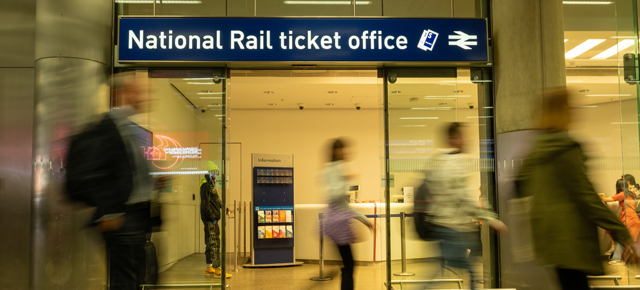Rail industry launches long-anticipated consultation into proposals that could see the vast majority of railway station ticket offices closed

BY Andrew Garnett
The Rail Delivery Group (RDG)confirmed perhaps the worst-kept secret in recent industry history on July 5 when it announced that train operators would start a statutory 21-day consultation over the closure of most railway station ticket offices.
Precise details about which station ticket offices will close or indeed those that will survive the cull have not been released.
The RDG said where adopted, the proposals will see ticket office staff transitioning to multi-skilled customer help roles. It said the move would mean a more visible and accessible staff presence across the network as a whole at stations during staffed hours, on ticket concourses and on platforms.
It claimed that current ticket office arrangements were stuck in the 1990s when the rules on how to sell tickets were set ahead of the privatisation of British Rail. The RDG claimed that then 82% of all tickets were sold at ticket offices, compared to just 12% on average today, a downward trend which accelerated during Covid-19.
The RDG continued: “Bringing staff out from offices would allow the railway to respond to that generational shift in customer behaviour, in common with many other industries and organisations that have long since done so, such as Transport for London, most airlines and many banks and supermarkets.”
Our proposals would mean more staff on hand to give face-to-face help with a much wider range of support, from journey planning to finding the right ticket and helping those with accessibility needs
Jacqueline Starr, chief executive of the RDG, added: “Our proposals would mean more staff on hand to give face-to-face help with a much wider range of support, from journey planning to finding the right ticket and helping those with accessibility needs.”
In response to an urgent question in parliament over the proposals from shadow transport secretary Louise Haigh, rail minister Huw Merriman said he was pleased that the rail industry had decided to launch the consultation process.
“First and foremost, this is all about taking expert ticketing staff into the parts of the station where currently they are not seen,” he said. “If only 10% of tickets are sold across the ticket counter, crudely, that means that 90% of passengers are not accessing that member of staff.
“The idea is to take the staff member on to the platform to help passengers purchase tickets via a ticketing machine or online. 99% of tickets can be purchased in that manner, so there is no reason why this will not be an improvement.”
He said that if staff did not wish to make the transition to the new customer-facing roles then “the train operators will need to look at that”.
Referring to the current stalemate with trades unions over plans to reform working practices, he added: “The sad reality is that there is an offer on the table that would guarantee no compulsory redundancies up to December 2024, but the union leaders refused to put that offer to their members.”
The unions reacted to the proposals with anger.
The decision to close up to 1,000 ticket offices and to issue hundreds of redundancy notices to staff is a savage attack on railway workers, their families and the travelling public
“The decision to close up to 1,000 ticket offices and to issue hundreds of redundancy notices to staff is a savage attack on railway workers, their families and the travelling public,” said RMT general secretary Mick Lynch.
“Travellers will be forced to rely on apps and remote mobile teams to be available to assist them rather than having trained staff on stations. This is catastrophic for elderly, disabled and vulnerable passengers trying to access the rail network.”
The TSSA union called on the public to oppose the mass closure of ticket offices and accused the industry of trying to “bring in redundancies by stealth”.
“We will continue to oppose ticket office closures which make no sense when it comes to running a railway for all and building up services in the post-Covid era,” said TSSA interim general secretary, Peter Pendle.
“Ticket office staff are hugely valued by the travelling public, and we urge commuters to resist these foolish plans by sending the government a crystal-clear message that they are on the wrong track.”
RDG said train companies will continue to engage constructively with unions at a local level to manage the transition in a way that works best for staff.
Our commitment is that we will always treat our staff, who are hugely valued and integral to the experience our customers have on the railway, fairly, with support and extra training to move into new more engaging roles
“Our commitment is that we will always treat our staff, who are hugely valued and integral to the experience our customers have on the railway, fairly, with support and extra training to move into new more engaging roles,” added Starr. “We also understand that our customers have differing needs, which is why the industry widely sought the views of accessibility and passenger groups when creating these proposals and will continue to through the consultation. We encourage those who wish to take part to go to their local train company website or visit Transport Focus or London Travelwatch.”
Train operators said the planned changes would be phased in gradually in order to ensure a smooth transition and that ticket vending machines across the railway network would be improved and upgraded.
“Ticket office facilities will remain open at the busiest stations and interchanges, selling the full range of tickets while the transition takes place,” RDG added. “Following these changes, if a customer is unable to buy a specific ticket before boarding the train because it was unavailable at the station, they would be able to buy one during their journey, at a ticket office en-route, or at their destination.”
Stations without ticket offices already make up 43% of those operating across the UK, with a further 40% being staffed part-time. In some cases, such as Bicester Village, those ticket offices are purpose-built and supported by a passenger reception desk. In other cases, ticket office facilities have been converted into community hubs, coffee shops and cafes while staff support passengers at gates and on station concourses.
Watchdogs confirm consultee roles
Both Transport Focus and London TravelWatch have confirmed their roles as statutory consultees for stations in England outside London and London respectively over proposals to close railway station ticket offices.
Transport Focus has confirmed it will look into whether the changes will impact the ability to buy a ticket or other rail products, the level of staff presence at stations and operators’ ability to deliver services for disabled passengers.
The watchdog said it was important to note that each train company has produced its own proposals – so there are 13 separate consultations running simultaneously rather than one, national consultation.
“Transport Focus will need to send a separate response to each consultation, commenting on the stations it covers,” the watchdog added.
Transport Focus chief executive Anthony Smith added: “It’s important for people to have their say. We urge passengers to look at the proposals and tell us what the ticket office changes might mean for them. Transport Focus will make sure passengers’ views are heard.”
This story appears inside the latest issue of Passenger Transport.
DON’T MISS OUT – GET YOUR COPY! – click here to subscribe!








